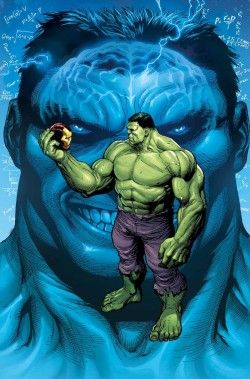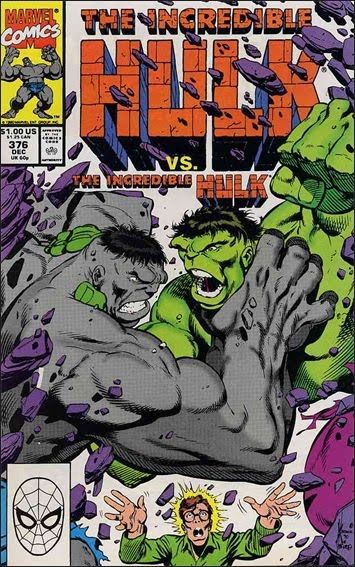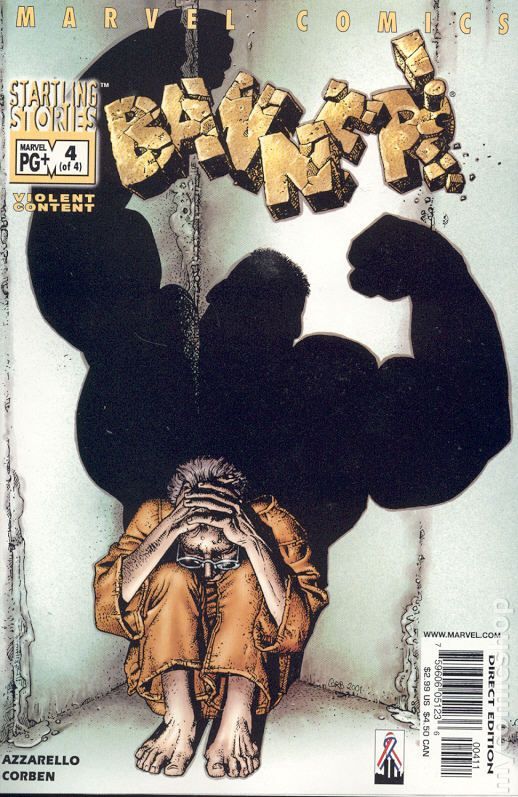The problem is that heroes win. Episodic storytelling can only get away with formula for a short amount of time before something has to change, and if there's one constant to mainstream comics, it's that the heroes should win. Maybe not all the time, but eventually.
When heroes lose, it bums us out. I'm not saying comics called "Magneto" or "Sabretooth" don't sell well, it's just they're not going to sell as well as one labeled "Wolverine." As readers, we come to see our heroes face a peril they will eventually overcome. Marvel's Civil War and Dark Reign were great examples of the heroes ostensibly losing the battle, but in time (and a couple of other events later) they would win the war.
With every success our heroes experience, a greater challenge should be on the horizon. No one wants to see Spider-Man fight street-level criminals forever; let's take him into space! Or put him with the Avengers! And so the stakes rise higher and higher with every foe defeated. Instead of having heroes face bigger and bigger catastrophes -- Earth can only be in peril in so times each week -- there has to be a different kind of challenge to keep our heroes on their toes and readers on the edge of their seats. So, we change the hero; maybe it's some new powers, maybe it's a new supporting cast, maybe we go facelift, costume change or new personality.
Take The Superior Spider-Man: Pretty much all of the above were thrown at Spider-Man to give the character a new look, new cast and new outlook. Stories began focusing less on if Spider-Man was going to win and more on how he was going to do it with Doctor Octopus in control. And because books with Doctor Octopus' name on the cover won't likely sell as well as those with Spider-Man's, there's little risk in making the switch for a while to see if it shakes things up. The old status quo eventually returns, and everyone feels like they got a little vacation.
Probably the best example of the personal shake-up is the Hulk. He's somewhat of a cottage industry of protagonists in himself. He has tons of supporting characters, and some of the most important ones to the Hulk mythology are those in his own head.
WARNING: Some talk of Hulk #6, so please grab a copy and read along!
The Hulk's core concept is brilliant and tedious at the same time. While man vs. the monster within is an excellent basis for conflict, we most often find ourselves in the cycle of "Eat, Sleep, Smash, Repeat." We want to see the Hulk fight. We want to see him smash tanks and fight monsters and be the Hulk. Therefore, bigger threats are created, bigger monsters are made and the next thing you know, there is simply nothing left to smash. After all, once you've tried to smash the Earth itself, going back to tussling with the Leader seems a little weak.
Given that he proclaims himself the strongest one there is, the Hulk's best adversary is himself. Can the Hulk defeat his own tortured soul? The character's best writers have really run with this idea and found that perfect balance between changes to the Hulk and giving us the smashing we want while keeping it within the "man vs. the monster inside" arena. There are different aspects to the Hulk that can provide us with more story; the Hulk in his origin story is a different kind of monster than the one we know today, as every shade of his personality has almost become a distinct character. From the most commonly known "savage" side -- the Hulk that's not too great with grammar but fantastic at throwing tanks -- to the Mr. Fixit gray-skinned form that's a lot closer to the Hulk from 1962's Incredible Hulk #1 -- a gruff, tough guy who's a little more sly and crafty. Both are the Hulk, but they're different enough to keep stories fresh and entertaining when they follow the "Eat, Sleep, Smash, Repeat" formula.
There's also a "Professor" Hulk, developed during the Peter David years and rather cleverly explained in Paul Jenkins' short run, a smarter monster that all but eliminated the need for Bruce Banner and could balance the smashing aspects with his own humanity. If anything, I'd say Banner can become an afterthought in his own book; after all, it's not his name on the cover or his face that sells T-shirts. Books that focus on Banner tend to be more chilling than thrilling, and perhaps that's why we prefer tossing tanks and smashing monsters than delving into the depths of the human soul.
Recently, thanks to the combined efforts of Mark Waid, Kieron Gillen and new writer Gerry Duggan, we have a new facet to the Hulk's personality: Doc Green. From the bullet to the brain pan Banner suffered under Waid to the Extremis "cure" from the Original Sin: Iron Man vs Hulk miniseries, Duggan introduces us to Doc Green in the pages of Hulk #5. So far, this Hulk seems similar to Professor Hulk -- although perhaps a little more sinister, as he's more openly arrogant, and there's no influence from Banner (in fact, he appears to be trapped inside his own mind). While his new attitude seems a radical departure from what we saw last issue, it's not as far of a stretch as one might think.
If any other hero had gone through as much internal changes as the Hulk, fans would be outraged. In fact, since the announcement that the title of "Thor, God of Thunder" will be given to a woman in an upcoming storyline, there have been all sorts of opinions coming out of the woodwork. However, for the Hulk, another change is just in his nature, and it keeps the Jade Giant swinging.




